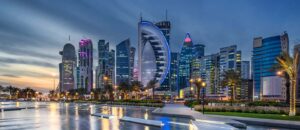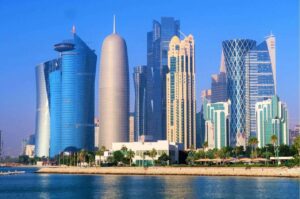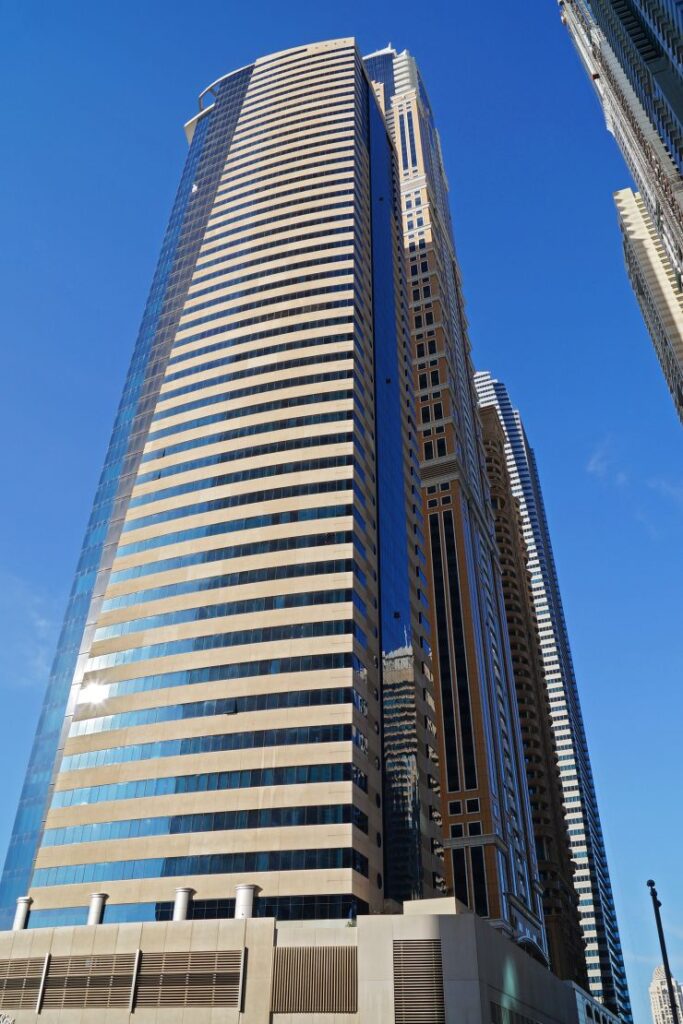Qatar has become an increasingly attractive destination for foreign investors looking to purchase investment property. The country’s rapidly growing economy, favorable government policies, and expanding tourism industry have all contributed to the growth of its real estate sector. If you’re considering investing in property in Qatar, here are some key things to keep in mind:
- Property purchase transactions in Qatar have risen significantly in recent years, with resident expats and foreign investors able to buy freehold villas and apartments in designated areas.
- The government of Qatar offers several tax benefits that can make investing in property in the country an attractive option. Additionally, there is a reduced income tax for foreign investors, making it a more cost-effective investment opportunity.
- Foreign nationals living in Qatar who wish to finance an investment property are required to put down 30% of the entire loan amount, which cannot exceed 70% of the property’s value. Depending on the bank and loan type, each bank will have a maximum loan amount that varies from QR 3 to 4 million.
Investing in property in Qatar can be a smart financial move for those looking to expand their investment portfolio. With a growing economy, favorable government policies, and a thriving real estate sector, Qatar offers a wealth of opportunities for foreign investors. However, it’s essential to do your research and understand the local regulations and financing options before making any investment decisions.

Understanding Qatar’s Real Estate Landscape
Key Areas for Investment
When it comes to investing in Qatar’s real estate market, there are several key areas that investors should consider. These areas include:
- The Pearl: an artificial island that offers high-end residential properties, luxury shopping, and dining options.
- West Bay: a commercial and residential district that is home to some of the tallest buildings in Qatar, including the iconic Burj Doha.
- Lusail is a planned city under intelligent city development that will house the Lusail Iconic Stadium, the site of the 2022 FIFA World Cup’s opening and closing ceremonies.
- Msheireb is a mixed-use development being built in the heart of Doha. It aims to be one of the most sustainable developments in the world.
Current Market Trends
Qatar’s real estate market has been on the rise in recent years, with the success of the 2022 FIFA World Cup being a significant driver of growth. According to Hapondo’s Q3 2023 Qatar Property Report, residential real estate dominates transactions, comprising 55%, up from 25% in 2010. Additionally, the real estate sector has grown by 20% between 2015 and 2021, reflecting investor confidence in Qatar’s real estate market.
Legal Framework and Ownership Regulations
Investors should also be aware of the legal framework and ownership regulations when investing in Qatar’s real estate market. The Ministry of Justice regulates real estate transactions in Qatar, and there are two types of properties available for purchase: freehold and leasehold properties. Non-Qataris can own freehold properties in designated areas, while leasehold properties can be owned by non-Qataris for a maximum of 99 years.
Real estate funds are also available for investors who want to invest in the real estate sector without owning physical property. The Qatar Financial Centre Regulatory Authority regulates these funds and offers investors a way to diversify their portfolios and invest in the real estate sector.
Overall, Qatar’s real estate market offers several opportunities for investors. Its critical areas for investment, current market trends, and transparent legal framework and ownership regulations make it a good choice.

Investment Opportunities in Qatar
Qatar has been attracting investors from all over the world due to its growing economy and favorable investment climate. In this section, we will explore some of the investment opportunities available in Qatar.
Commercial vs. Residential Properties
Investors can choose between commercial and residential properties in Qatar. While commercial properties offer higher rental yields, residential properties provide capital appreciation. The choice between the two depends on the investor’s investment goals. Commercial properties are ideal for investors looking for a stable income stream, while residential properties are better suited for those looking for long-term capital appreciation.
Emerging Sectors and Regions
Qatar’s real estate market is constantly evolving, with emerging sectors and regions offering lucrative investment opportunities. The country’s infrastructure development projects have opened up new investment opportunities in areas such as logistics, warehousing, and industrial properties. Additionally, emerging regions such as Lusail and Al Khor are attracting investors due to their growth potential.
Impact of Major Events on Property Values
Major events like the FIFA World Cup 2022 have a remarkable impact on the market in Qatar. The event has led to a surge in demand for properties in the country, with investors looking to capitalize on the expected increase in tourism. The event is predicted to have a positive impact on property values, with capital appreciation expected in the long term.
Other Investment Opportunities
Apart from real estate investment, Qatar offers a range of investment opportunities in other sectors, such as tourism, infrastructure, and economic development. The country’s GDP growth and favorable investment climate make it an attractive destination for investors.
Some of the investment opportunities in Qatar include:
- Infrastructure projects
- Growth in the tourism sector
- Economic development initiatives
Investors looking for investment opportunities in the Middle East should consider Qatar due to its favorable investment climate and growing economy.

Financial Aspects of Property Investment
Understanding Costs and Returns
When investing in Qatar’s real estate sector, it is essential to understand the costs and returns associated with the investment. The costs can include the purchase price of the property, maintenance costs, taxes, and insurance.
Real estate investors need to carry out in-depth market research to choose the most prospective regions and property kinds for investment in order to guarantee a lucrative venture. They should also understand the demand-supply dynamics and market trends to make informed decisions.
Financing Options
Real estate investment in Qatar can be financed through various options, including bank loans, investment funds, and foreign direct investment. Qatar-based financial services providers like HSBC and Doha Bank offer financing options to foreign investors.
Investors must consider their investment goals and choose the financing option that aligns with their long-term investment strategy. They should also calculate the compound annual growth rate (CAGR) to determine the profitability of their investment.
Real Estate Investment Trusts (REITs)
If you want to invest in real estate without holding physical property, Real Estate Investment Trusts (REITs) are a great choice. Investment firms known as REITs combine investor capital to buy and oversee income-producing real estate holdings.
REITs offer several benefits, including diversification, liquidity, and tax benefits. They also provide investors with a regular stream of income in the form of dividends.
Investors should conduct thorough research on the REITs before investing and consider factors like the fund’s track record, management team, and fees.
- Bank loans, investment funds, and foreign direct investment are financing options for real estate investment in Qatar.
- Investors must consider their investment goals and choose the financing option that aligns with their long-term investment strategy.
- REITs are an excellent investment option for those who want to invest in the real estate sector without owning physical property.
- Investors should conduct thorough research on the REITs before investing and consider factors like the fund’s track record, management team, and fees.
Living in Qatar: Benefits and Considerations

Residency and Legal Status
- Non-Qataris can buy property in Qatar, and if the property is valued at QAR 3,650,000 (USD 1,000,000) or above, they can apply for a residency permit for themselves and their family.
- Qatar offers permanent residency to foreigners who purchase properties in certain areas.
- The Qatar Central Bank has regulations for mortgage lending to expats, such as a maximum mortgage term of 20 years and a maximum age of 65 years at the time of loan maturity.
Lifestyle and Community
- Qatar offers a stable and secure environment for expats and their families.
- The country has a diverse and multicultural community, making it easy for expats to find like-minded individuals and form a community.
- Qatar is urban living at its best, with modern amenities and infrastructure.
- The Qatar National Vision 2030 aims to create a sustainable and prosperous future for Qatar, with a focus on education, healthcare, and infrastructure.
Healthcare and Education
- Qatar offers affordable and high-quality healthcare to its residents, with both public and private healthcare facilities available.
- Expats can enroll their children in international schools that offer a high standard of education.
- Qatar offers educational benefits to permanent residents, including access to scholarships and university education.
Overall, living in Qatar offers many benefits for expats and their families. With a stable and secure environment, a diverse and multicultural community, and a focus on education and healthcare.
Navigating the Purchase Process
Investing in property in Qatar can be rewarding, but it is crucial to understand the purchase process. Here are the steps to acquire investment property and the role of real estate agents in the process.
Steps to Acquire Investment Property
- Research: Before investing in property, it is essential to research the market and identify the type of property that is in demand.
- Financing: Determine the budget and financing options available, including mortgages and loans.
- Property Search: Look for properties that meet the investment criteria, either through real estate agents, online listings, or property developers.
- Offer and Negotiation: Make an offer and work with the seller to work out the conditions and pricing.
- Due Diligence
- Closing: Sign the purchase agreement, pay the deposit, and complete the transaction.
Role of Real Estate Agents
Real estate agents can assist with property search, negotiation, and due diligence. Here are some benefits of working with a real estate agent:
- Expertise: Real estate agents have knowledge of the market and can offer insights into property trends and investment opportunities.
- Network: They have a network of contacts, including property developers, lawyers, and financiers, which can be helpful during the purchase process.
- Negotiation: Real estate agents can negotiate on behalf of the buyer, ensuring that the best price and terms are obtained.
- Legal Assistance: Real estate agents can provide legal assistance during the purchase process, ensuring that all legal requirements are met.
Investing in property in Qatar can be a complex process, but with the proper research and assistance from a real estate agent, it can be a profitable venture.
Qatar MLS
Qatar MLS serves as a remarkable platform that connects real estate professionals and facilitates the discovery of potential clients. As a subsidiary of Arab MLS, it stands as the ultimate center for innovation and excellence in real estate. Subscribing to Qatar MLS opens the door to unprecedented opportunities, marking a pioneering moment in Qatar’s real estate landscape.

Frequently Asked Questions
What are the legal requirements for expats purchasing investment property in Qatar?
- Expats must obtain an investor residence permit to purchase real estate in Qatar.
- The property must be located in a designated foreign ownership zone, such as The Pearl-Qatar, West Bay Lagoon, or Al Khor Resort Project.
- At most, 70% of the property’s value must be represented by the entire loan amount.
- Expats must make a 30% down payment.
- The maximum age for expats at loan maturity is 65 years old.
How does the Qatari real estate market compare to other investment opportunities in the region?
- Qatar’s real estate market is one of the most stable and lucrative in the region.
- The country’s strategic location, growing economy, and political stability make it an attractive destination for foreign investors.
- The government’s focus on infrastructure development, including the upcoming FIFA World Cup, provides ample opportunities for real estate investment.
What are the potential returns on investment for properties in Qatar?
- Rental earnings, profit from resale, and capital appreciation are the primary sources of potential profit from real estate investment in Qatar.
- The rental yield for residential properties in Qatar is around 5-7%.
- The average annual capital appreciation for residential properties in Qatar is around 3-5%.
Can foreign investors obtain financing for property investments in Qatar?
- Yes, foreign investors can obtain financing for property investments in Qatar.
- In Qatar, mortgages for off-plan homes are only accessible when the buyer has paid off 50% of the house, with a maximum loan-to-value ratio of 50%.
- There will also be restrictions on the kind of properties and projects that banks are willing to fund.
What are the tax implications for owning investment property in Qatar?
- There is no income tax on rental income in Qatar.
- Capital gains tax does not apply to real estate investments in Qatar.
- However, property owners are subject to a yearly property tax of 10% of the annual rental value.
How does the Qatar Real Estate Investment Company facilitate property investment for foreigners?
- The Qatar Real Estate Investment Company (QREIC) is a leading real estate investment company in Qatar.
- QREIC provides a wide range of real estate investment opportunities, including commercial, residential, and hospitality properties.
- The company also offers property management services, ensuring a hassle-free investment experience for its clients.












